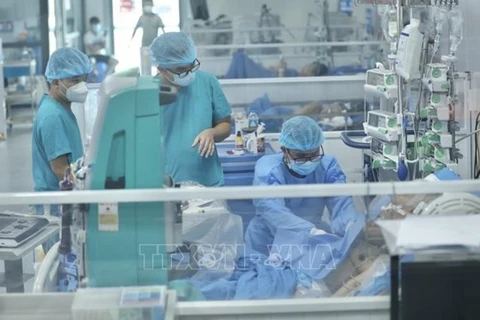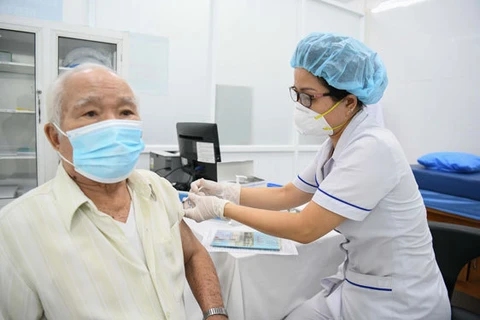Hanoi (VNS/VNA) - The Ministry of Health is continuing to develop a sustainable response plan to the COVID-19 pandemic in the new situation, considering the context of dangerous new variants appearing.
The plan is also to strengthen integrated surveillance of COVID-19 and other respiratory infections.
The World Health Organisation (WHO) recently announced that COVID-19 is no longer a public health emergency of global concern. However, the WHO Director-General stressed that the declaration does not mean COVID-19 is no longer a threat or that COVID-19 is less dangerous, said Prof. Dr. Phan Trong Lan, Director of the Ministry of Health's Department of Preventive Medicine.
The WHO assessed the risk of COVID-19 as still high globally. Although the number of cases and deaths has decreased globally, there is still an increase in each region.
The SARS-CoV-2 virus itself is still changeable. At the beginning of April, WHO announced there were about 400-500 sub-variants of Omicron, but by early May, this number was 900, Lan said.
The organisation always reminds countries to be wary of emerging variations.
According to the director, currently, the pandemic is increasing in Southeast Asia, including Vietnam. Every day, Vietnam records about 2,000 COVID-19 cases, including deaths, one of ten post-COVID-19 related.
COVID-19 still burdens the health system, he noted.
Vietnam has appropriately responded to the epidemiological situation in each period. Since October 2021, Vietnam has switched to safe, flexible adaptation and effective control.
The Ministry of Health is to develop a sustainable response plan to the COVID-19 pandemic in the new situation.
In addition, the ministry diversifies disease surveillance activities to properly assess the epidemic situation to implement appropriate response measures, including key, regular, integrated, event-based and random monitoring.
Random surveillance at the border gate is not mandatory, but it still brings benefits to the community, so people need to coordinate, Lan said.
Regarding the question of when Vietnam will announce the end of COVID-19, Lan said that currently, the country no longer has travel restrictions. In contrast, the nature of SARS-CoV-2 can still travel on healthy people and cross administrative barriers.
Immunity to COVID-19 will decrease over time, and new waves may still emerge from one area to another.
Therefore, the COVID-19 epidemic is difficult to predict and unpredictable and has increased in each region.
Regarding the announcement, the Law on Prevention and Control of Infectious Diseases stipulates that epidemic announcement includes five contents; time, place, scope and scale; cause and transmission route and dangerous nature of the pandemic; prevention measures; and medical examination and treatment facilities.
With these five contents, it is still necessary to continue to publish data on the epidemic for relevant agencies and the people to understand helping to control the pandemic quickly, Lan said.
The Ministry of Health continues to recommend that people must maintain the 2Ks measures (wearing masks and disinfection), vaccines, medicines, and people's awareness in the long-term prevention and control of COVID-19, he added./.
The plan is also to strengthen integrated surveillance of COVID-19 and other respiratory infections.
The World Health Organisation (WHO) recently announced that COVID-19 is no longer a public health emergency of global concern. However, the WHO Director-General stressed that the declaration does not mean COVID-19 is no longer a threat or that COVID-19 is less dangerous, said Prof. Dr. Phan Trong Lan, Director of the Ministry of Health's Department of Preventive Medicine.
The WHO assessed the risk of COVID-19 as still high globally. Although the number of cases and deaths has decreased globally, there is still an increase in each region.
The SARS-CoV-2 virus itself is still changeable. At the beginning of April, WHO announced there were about 400-500 sub-variants of Omicron, but by early May, this number was 900, Lan said.
The organisation always reminds countries to be wary of emerging variations.
According to the director, currently, the pandemic is increasing in Southeast Asia, including Vietnam. Every day, Vietnam records about 2,000 COVID-19 cases, including deaths, one of ten post-COVID-19 related.
COVID-19 still burdens the health system, he noted.
Vietnam has appropriately responded to the epidemiological situation in each period. Since October 2021, Vietnam has switched to safe, flexible adaptation and effective control.
The Ministry of Health is to develop a sustainable response plan to the COVID-19 pandemic in the new situation.
In addition, the ministry diversifies disease surveillance activities to properly assess the epidemic situation to implement appropriate response measures, including key, regular, integrated, event-based and random monitoring.
Random surveillance at the border gate is not mandatory, but it still brings benefits to the community, so people need to coordinate, Lan said.
Regarding the question of when Vietnam will announce the end of COVID-19, Lan said that currently, the country no longer has travel restrictions. In contrast, the nature of SARS-CoV-2 can still travel on healthy people and cross administrative barriers.
Immunity to COVID-19 will decrease over time, and new waves may still emerge from one area to another.
Therefore, the COVID-19 epidemic is difficult to predict and unpredictable and has increased in each region.
Regarding the announcement, the Law on Prevention and Control of Infectious Diseases stipulates that epidemic announcement includes five contents; time, place, scope and scale; cause and transmission route and dangerous nature of the pandemic; prevention measures; and medical examination and treatment facilities.
With these five contents, it is still necessary to continue to publish data on the epidemic for relevant agencies and the people to understand helping to control the pandemic quickly, Lan said.
The Ministry of Health continues to recommend that people must maintain the 2Ks measures (wearing masks and disinfection), vaccines, medicines, and people's awareness in the long-term prevention and control of COVID-19, he added./.
VNA























